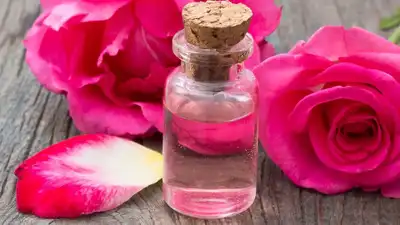Rose Water for Eye Care: Benefits and Precautions

Rose water is a fragrant liquid made from rose petals. It has been valued for centuries due to its soothing and healing properties. Besides its use in cooking and skincare, rose water offers several benefits for eye care. Its anti-inflammatory, antimicrobial, and hydrating properties make it a valuable homemade remedy for various eye conditions.
Rose water is a gentle, natural remedy for treating a variety of eye problems. These range from dry eyes and irritation to more specific conditions like conjunctivitis and cataracts. It may be a useful addition to your eye care routine. However, use it correctly and consult a medical professional if you have existing eye conditions or other medical issues. Quality and safety should always be your priority when selecting rose water products. According to Healthline, rose water might help relieve pain from burning or puffy eyes. Check out the benefits, precautions, and possible side effects below.
Rose Water Benefits for Eye Health
Relieves Eye Redness and Irritation
One of the most significant uses of rose water in eye care is its ability to alleviate redness and inflammation. A study published in the Journal of Intercultural Ethnopharmacology (2015) found that rose water contains flavonoids and terpenes that have anti-inflammatory effects. When applied properly, it can soothe irritation caused by:
- Exposure to dust or pollution
- Extended screen time
- Allergens such as pollen or animal dander
Its soothing quality makes it ideal for irritated eyes that are sensitive to discomfort.

Lubricates Dry and Fatigued Eyes
Dry eyes can happen due to environmental factors, excessive use of digital devices, or low tear secretion. Rose water can act as a natural moisturizer to keep the eyes lubricated. The Indian Journal of Experimental Biology reports that the cooling property of rose water can relieve eye strain and reduce the burning sensation associated with dryness.
Facilitates Healing in Conjunctivitis
Conjunctivitis, or “pink eye,” is the redness of the conjunctiva due to inflammation, often triggered by bacteria or viruses. Studies show that rose water has mild antimicrobial and antiseptic effects, which might ease symptom severity. As an adjunct to medical treatment, using sterile rose water may promote healing by calming inflammation and minimizing irritation (see Avicenna Journal of Phytomedicine, 2016).
May Reduce Cataract Progression
While cataracts need to be operated on in advanced stages, antioxidants are thought to delay their occurrence by protecting the eye from oxidative stress. Rose water contains phenolic compounds, which are natural antioxidants. They counteract free radical damage and can lower inflammation in the eye, potentially playing a supportive role in preventing early-stage cataracts (Pharmacognosy Review, 2012). However, more clinical studies are needed to prove this benefit conclusively.

Rose Water for Eyes: Precautions and Possible Side Effects
Even though rose water comes from a natural source, it is not risk-free, especially when applied near the sensitive eye area.
Test for Allergy
Some individuals may be allergic to rose extracts. Symptoms include:
- Redness
- Itching
- Swelling of the eyes
Always perform a patch test before applying rose water close to your eyes.
Use Only Sterile and Preservative-Free Products
Avoid using homemade or non-sterile rose water in the eyes, as it could cause infections. Opt for ophthalmic-grade or lab-distilled rose water that is safe for eye use.
Get Medical Advice if You’re Taking Eye Medications
If you’re using prescription eye drops for glaucoma, infections, or allergies, consult your ophthalmologist before incorporating rose water into your regimen. It might interfere with drug absorption.
How to Use Rose Water Safely in Eye Care
Eye Wash (for Redness or Irritation)
Mix equal parts of sterile rose water and distilled water. Apply 1–2 drops in each eye using a clean dropper. Blink gently to allow it to seep in. This can be used to calm irritation and wash out allergens.
Cold Compress (for Puffiness or Tired Eyes)
Soak a soft, clean cloth in cold rose water. Wring out the excess and apply it over closed eyelids for 10–15 minutes. The cool temperature, along with the anti-inflammatory property of rose water, reduces puffiness and fatigue.
Cotton Pad Treatment (for Dark Circles and Dry Eyes)
Soak cotton pads in cold rose water and place them over your eyes for 15–20 minutes. This moisturizes the skin around your eyes and can help minimize dark circles with repeated use, as mentioned in Ayurvedic skincare routines.

How to Pick the Best Rose Water for You
To ensure safety and efficacy, choose rose water that is:
- 100% pure and organic
- Free of preservatives and artificial perfume
- Distilled in aseptic conditions
- Clearly marked for cosmetic or ophthalmic application



